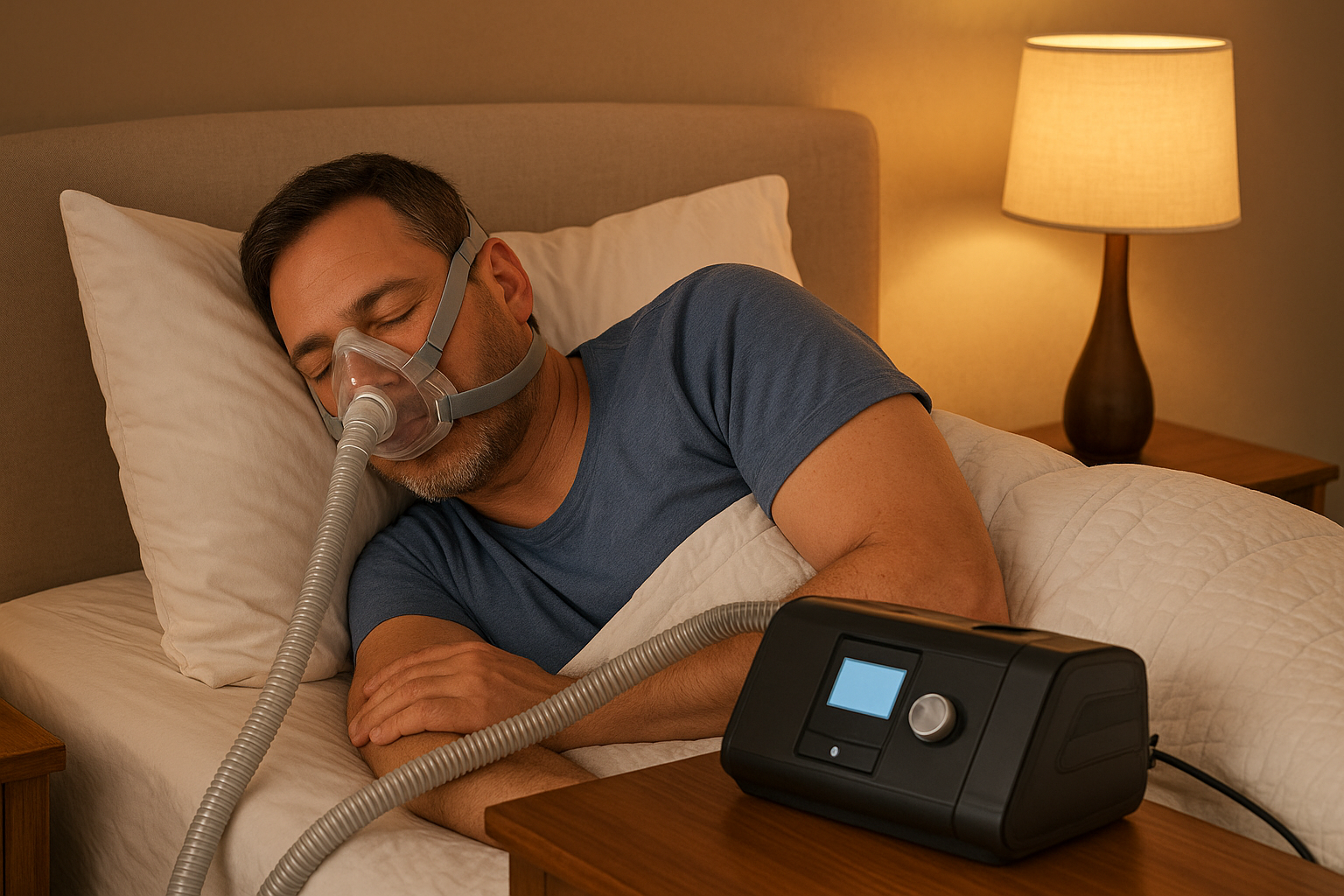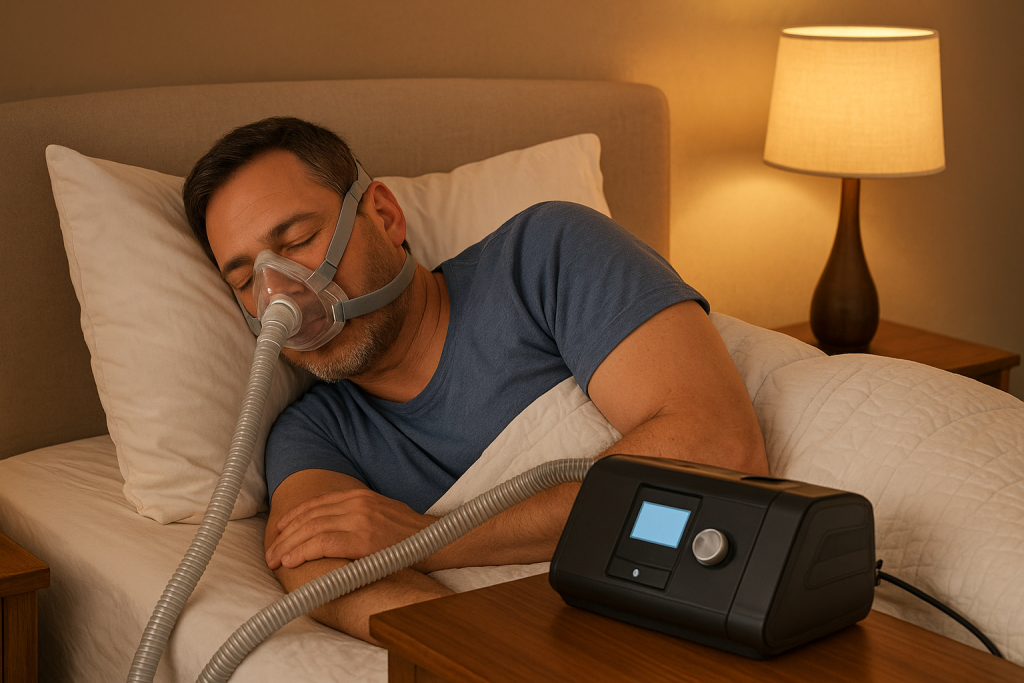Best CPAP Machine for Sleep Apnea: Complete Guide to Better Sleep


Meta Description
Looking for the best CPAP machine for sleep apnea? Discover benefits, types, costs, and top brands to improve your sleep and health today.
What Is a CPAP Machine for Sleep Apnea?
Sleep apnea is a serious sleep disorder where breathing repeatedly stops and starts throughout the night. The most common type, obstructive sleep apnea (OSA), occurs when throat muscles relax excessively and block the airway. This leads to loud snoring, poor sleep quality, and in severe cases, dangerous drops in oxygen levels.
A CPAP machine (Continuous Positive Airway Pressure) is the most effective treatment for sleep apnea. It works by delivering a constant stream of pressurized air through a mask, keeping the airway open so breathing remains uninterrupted.
Understanding Sleep Apnea and Its Impact on Health
Left untreated, sleep apnea can contribute to high blood pressure, heart disease, stroke, diabetes, and even depression. Many people feel constantly fatigued, irritable, and struggle with concentration.
How CPAP Therapy Works
The CPAP machine prevents airway collapse by creating a cushion of air pressure. This not only improves sleep quality but also reduces the health risks associated with untreated sleep apnea.
Benefits of Using a CPAP Machine for Sleep Apnea
Using a CPAP machine has immediate and long-term benefits:
Improved Sleep Quality
People often notice deeper, uninterrupted sleep after just a few nights of therapy.
Reduced Risk of Heart Disease and Stroke
By maintaining healthy oxygen levels, CPAP therapy significantly lowers cardiovascular risks.
Boosted Energy and Mental Clarity
With better sleep, daytime fatigue decreases, and focus improves.
Long-Term Health Benefits
Over time, CPAP users experience reduced risk of chronic illnesses and improved overall well-being.
Types of CPAP Machines for Sleep Apnea
Not all CPAP machines are the same. Here are the main types:
Standard CPAP Machines
Deliver a fixed air pressure level set by your doctor.
Auto-Adjusting CPAP (APAP) Machines
Automatically adjust pressure based on your breathing needs.
BiPAP Machines
Provide two pressure levels—one for inhaling and a lower one for exhaling—ideal for patients who find standard CPAP uncomfortable.
Travel CPAP Machines
Lightweight and portable, perfect for frequent travelers.
Choosing the Right CPAP Machine for Sleep Apnea
Selecting the right machine is critical for comfort and long-term success. A poorly chosen device or mask can discourage consistent use.
Factors to Consider: Pressure Settings, Noise Level, and Comfort
- Pressure Settings: Machines must deliver the correct air pressure prescribed by your sleep specialist. Auto-adjusting models (APAP) may be more flexible.
- Noise Level: Modern devices are generally quiet, but some are nearly silent—ideal if you share a bedroom.
- Comfort Features: Ramp settings gradually increase pressure as you fall asleep, making it easier to adjust.
Mask Options: Full-Face, Nasal, and Nasal Pillow Masks
- Full-Face Mask: Covers both mouth and nose, suitable for mouth breathers.
- Nasal Mask: Covers only the nose, comfortable and less bulky.
- Nasal Pillow Mask: Small, lightweight, and minimally invasive—great for those who feel claustrophobic.
Humidifiers and Other Features
Many CPAP machines come with built-in humidifiers to prevent dryness and irritation. Other features include heated tubing, Bluetooth connectivity, and compliance tracking apps.
How to Use a CPAP Machine Correctly
Using the machine the right way ensures maximum benefits.
Step-by-Step Setup
- Fill the humidifier chamber with distilled water.
- Attach the tubing and mask.
- Place the machine on a stable, flat surface.
- Adjust mask straps for a snug but comfortable fit.
- Turn on the device and breathe normally.
Maintenance and Cleaning Tips
- Wash the mask and tubing weekly with mild soap and water.
- Replace filters every 1–3 months.
- Change masks every 6–12 months to ensure a proper seal.
Troubleshooting Common Problems
- Air leaks: Readjust straps or replace cushions.
- Dryness: Add a humidifier or increase humidity settings.
- Noise: Check tubing for leaks and ensure proper machine placement.
Side Effects and How to Manage Them
Though CPAP therapy is safe, some users may face minor issues.
Dry Mouth and Nasal Congestion
Using a humidifier or nasal saline spray can help relieve dryness.
Mask Leaks and Discomfort
Experimenting with different mask sizes or types often solves the issue.
Difficulty Adjusting to CPAP Therapy
Patience is key. Start by wearing the mask for short periods while awake to get used to the sensation.
Cost of a CPAP Machine for Sleep Apnea
Investing in a CPAP machine can feel overwhelming, but the long-term health benefits outweigh the cost.
Price Range of CPAP Machines
- Standard CPAP: $300 – $800
- Auto CPAP (APAP): $500 – $1,200
- BiPAP: $1,000 – $3,000
Insurance Coverage and Reimbursement
Most insurance plans cover part or all of the cost, provided you have a valid prescription and diagnosis.
Buying vs. Renting Options
- Buying: Best for long-term use, with warranties available.
- Renting: Affordable for short-term needs, often through medical supply companies.
Best Brands and Models of CPAP Machines
Several trusted brands dominate the CPAP market.
ResMed CPAP Machines
Known for quiet operation, sleek design, and advanced features like mobile app connectivity.
Philips Respironics
Popular for comfort, reliability, and flexible settings.
Fisher & Paykel Healthcare
Offers user-friendly designs and integrated humidifiers.
Other Reliable Brands
DeVilbiss, Somnetics, and Apex Medical provide affordable and travel-friendly options.
Alternatives to CPAP Therapy
Not everyone adapts to CPAP therapy. Alternatives include:
Oral Appliances
Custom-made mouthpieces reposition the jaw and tongue to keep the airway open.
Lifestyle Changes
Losing weight, avoiding alcohol, and sleeping on your side can reduce symptoms.
Surgery Options
Procedures like UPPP (Uvulopalatopharyngoplasty) or inspire therapy (implantable device) may be recommended for severe cases.
Frequently Asked Questions (FAQs)
1. What is the average lifespan of a CPAP machine?
Most CPAP machines last between 5–7 years with proper care and maintenance.
2. Can a CPAP machine cure sleep apnea?
No, CPAP does not cure sleep apnea, but it effectively manages symptoms and prevents complications.
3. How do I know if I need a CPAP machine?
If you’ve been diagnosed with moderate to severe sleep apnea after a sleep study, your doctor may recommend CPAP therapy.
4. Is it safe to use a CPAP machine every night?
Yes, it’s not only safe but necessary. Consistent use ensures the best health outcomes.
5. How often should I replace CPAP masks and filters?
- Mask cushions: Every 1–3 months
- Filters: Every 1–3 months
- Mask frame/headgear: Every 6–12 months
6. Can I travel with my CPAP machine?
Yes. Travel CPAP devices are designed to be lightweight and compact. Most airlines allow CPAP machines as medical equipment.
Conclusion: Why a CPAP Machine for Sleep Apnea Is a Life-Changing Investment
A CPAP machine for sleep apnea is more than just a medical device—it’s a gateway to better sleep, improved health, and a higher quality of life. By choosing the right machine, learning proper use, and sticking with therapy, patients often experience life-changing results within weeks.
If you or a loved one suffers from sleep apnea, talk to your doctor today about starting CPAP therapy. Restful nights and healthier days are within reach.
👉 For more resources, visit the American Sleep Apnea Association: sleepapnea.org.
















